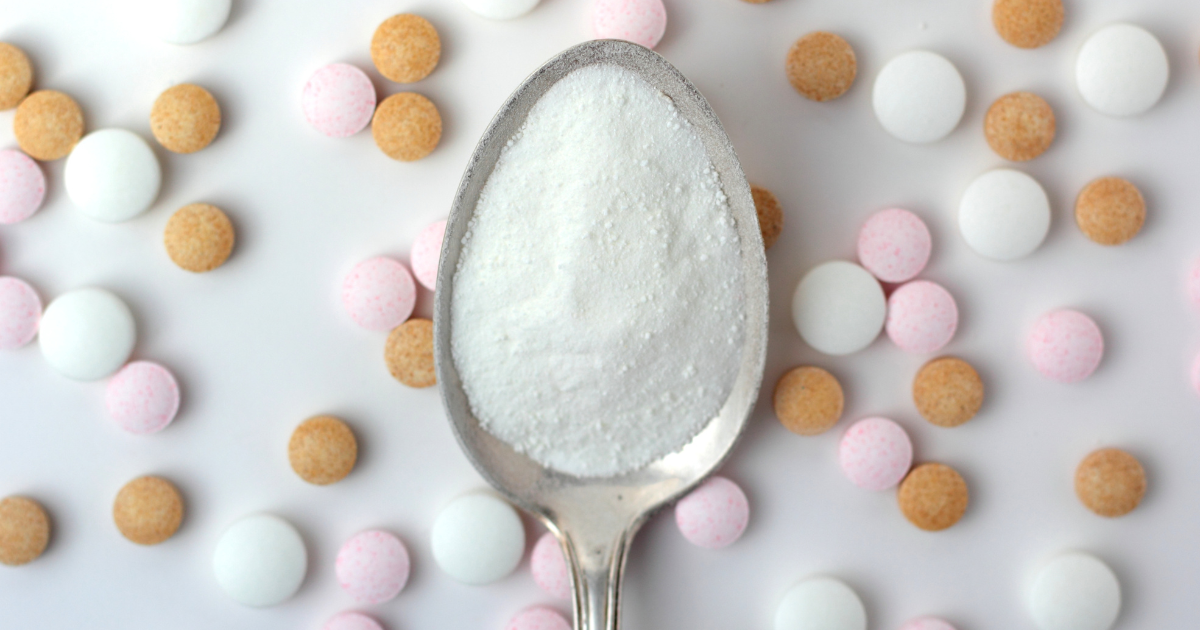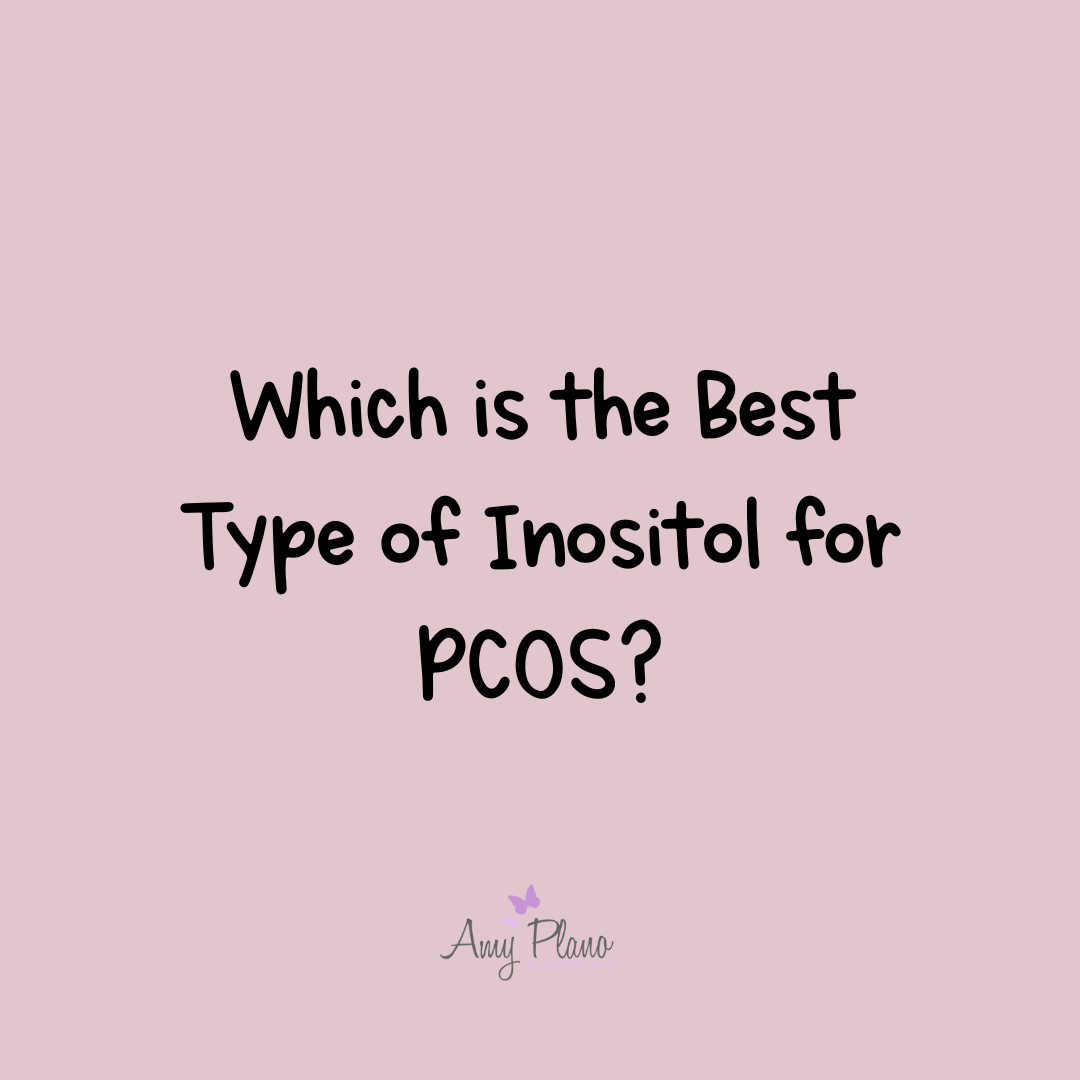Have you been struggling with finding the right treatment for your Polycystic Ovarian Syndrome (PCOS) symptoms? The supplement inositol may be the answer you have been searching for. But are you curious which is the best type of inositol for PCOS?
Inositol is a naturally occurring sugar that plays an important role in the body for healthy ovulation and fertilization.
For women with PCOS, inositol may have some powerful benefits such as restoration of a regular menstrual cycle, improved ovarian function, and improved fertility. Studies have shown that inositol can also reduce insulin resistance, which is often closely related to PCOS!
Are you interested in learning more about PCOS and insulin resistance? Head over to this page on my website to learn more about insulin resistance and how it can be a driver of PCOS.
Keep reading this article to learn what inositol is, how it can treat PCOS symptoms, a few of its benefits, and which type is best for you. Make sure to save this post for later and share it with a friend or loved one who needs it!
What is Inositol?

Maybe you’ve heard of inositol if you’ve been looking for different options to treat PCOS, or maybe the term is new to you. Either way, this section is going to be a great resource to explain everything you need to know.
As I mentioned above, Inositol is a naturally occurring sugar. It has the same chemical identity as glucose but with a different structure. The compound is composed of 9 different stereoisomers, meaning that there are 9 different three-dimensional structures.
When we are talking about PCOS and the human body, we will only talk about 2 of the 9 stereoisomers: Myo-inositol (MI) and D-chiro-inositol (DCI).
MI and DCI have various important roles throughout the human body. A couple worth noting is decreasing blood sugar after meals and responding to insulin.
Inositol is an important treatment option to understand because it can be cheap and effective for PCOS patients. However, it can be confusing to know which type and supplement is right for you.
Don’t worry, we’re here to help! While we ultimately recommend working with a registered dietitian to formulate your supplement routine, having a base-level understanding is important as well.
Myo-Inositol vs. D-Chiro-Inositol
In this section, I will be providing a breakdown of the differences between MI and DCI. This will give you a basic knowledge set about their important roles in your body.
It’s key to understand these because inositol supplements for PCOS are usually made up of both MI and DCI.
Myo-inositol (MI)
- MI is most widely distributed in nature.
- It is most often consumed through fruits, beans, grains, and nuts.
- In addition to consuming MI, the body also makes it.
- MI breaks down glucose.
- In the ovaries, it is responsible for responding to the follicle-stimulating hormone (FSH), which signals for proper egg development and release, improves the growth of cells that become eggs, and regulates the hormone AMH which improves egg maturation.
- In the ovaries specifically, MI is needed at much higher levels compared to DCI. The ratio should be 100:1.
D-chiro-inositol (DCI)
- DCI is responsible for storing glucose within the body in the form of glycogen.
- It’s higher in organs that need immediate access to energy like the liver and muscles.
- In the ovaries, it increases testosterone levels in response to insulin.
Both
- Naturally occurring and found in nature.
- Play an important role in glucose metabolism.
- Participate in the body’s response to insulin.
- Have specific roles in follicular development.
As you can see, MI and DCI have different functions in the body. Because of this, they are needed in different amounts. A regular ovary balance of the two will support normal hormonal secretion and ovarian function.
The ideal ratio of MI to DCI in follicular fluid is 100:1. In patients with PCOS, the ratio has higher amounts of DCI. Further, patients have been found with ratios as low as 0.2:1, which can be the root of a lot of problems!
How Does Inositol Treat PCOS?

Now that you know what MI and DCI do, let’s put it all together to understand how inositol can treat PCOS!
- PCOS is associated with insulin resistance, which can be the root cause of PCOS.
- In the body, the ovaries are extra sensitive to excess insulin.
- Excess insulin can lead to unwanted effects of PCOS like high testosterone, difficulties with ovulation, and infertility.
- These unwanted effects in the ovaries are caused by the epimerase enzyme, which is activated by excess insulin. This enzyme converts MI to DCI which causes more testosterone production.
- Studies support that inositol can decrease insulin resistance and testosterone levels, therefore reducing unwanted side effects like acne, hair growth, irregular menstruation, and infertility.
In summary, high MI is needed for healthy ovulation and we don’t want too much DCI. Additionally, excess insulin can convert MI to DCI, which causes extra testosterone and unwanted side effects.
An inositol supplement can treat PCOS by restoring healthy levels in the body. Healthy levels increase insulin sensitivity, reduce excess insulin, and prevent ovaries from producing too much testosterone.
What are the Benefits of Taking Inositol for PCOS?
Are you curious about the specific benefits of taking inositol?
Here are what the studies are saying:
- Effects on metabolic processes
-
- Improved insulin sensitivity
- Decreased blood pressure
- Decreased triglycerides and total cholesterol
- Decreased BMI and fat mass
- Effects on hyperandrogenism (A medical condition characterized by high levels of androgens, most often caused by PCOS. Symptoms of hyperandrogenism may include acne, inflamed skin, hair loss on the scalp, increased body or facial hair, and infrequent or absent menstruation).
-
- Decreased androgen concentrations
- Increased sex hormone-binding globulin (SHBG)
- Effects on the menstrual cycle and Ovulation
- Improved menstrual regularity
- Improved ovulation rate
An inositol supplement can have some pretty positive effects for those struggling with PCOS.
Now you may be wondering, “What’s the catch?” A lot of patients ask if there are any unwanted side effects of inositol. There are currently no reported side effects at the recommended dose, which I will talk about next.
Which Inositol is Best for PCOS?

Now the part you have been waiting for: what in the world do I actually take as a supplement? There are so many options, how do I know what’s right?
The first important thing you should be looking for is a 40:1 ratio of MI: DCI. This has been proven as being the most beneficial ratio for improving PCOS symptoms!
The 40:1 ratio has been proven more effective than MI alone in reducing bad cholesterol and triglycerides. Even further, this ratio has even been shown to restore ovulation, which is amazing! Especially if you struggle with infertility.
Additionally, studies have shown that taking inositol in combination with folic acid can reduce symptoms of PCOS.
The second most important thing to know is to never take DCI on its own. Increasing DCI too much creates the loss of the beneficial reproductive effects that inositol can have. It needs to be in that specific ratio with MI to work effectively. In this case, more isn’t better!
Now you know that the 40:1 ratio is the best for treating PCOS, but what dosage should you take?
Inositol can be taken safely at 2,000-4,000 mg per day. It’s recommended to take two doses of 2,000 mg for best results. One in the morning and one at night. However, you will want to take the dose that your doctor or healthcare team recommends for you.
If you’re looking online or at the store, you may notice you can buy capsules or a powder form. The capsules are the same as the white powder but in tablet form. This choice is really up to you. The powder can be mixed in water, tea, or coffee. See what works best for you!
Lastly, remember to look for brands that follow good manufacturing practices (GMP) and always do your research.
Again I will mention how essential it is to talk to a doctor or registered dietitian before taking any new supplements. You do not want to supplement blindly and inositol may not be for everyone!
The Takeaway
Finding alleviation of your PCOS symptoms can be exhausting, and the millions of supplements to choose from can feel overwhelming.
The good news is, I am here to help! The most important thing to know is that you should look for a 40:1 MI to DCI ratio. For dosage, it should be between 2,000-4,000 mg per day.
While inositol is a cheap and effective treatment option, about 30% of patients are resistant to inositol treatment. So it’s not guaranteed to work for everyone! However, it may be an option to bring up with your healthcare team.
Don’t wait another minute frustrated with your PCOS symptoms. Together we can help you lose weight, get healthy AF, and find your happiness again. Read through my list of comprehensive, effective nutrition programs to find the perfect fit for you. Can’t wait to hear from you!

